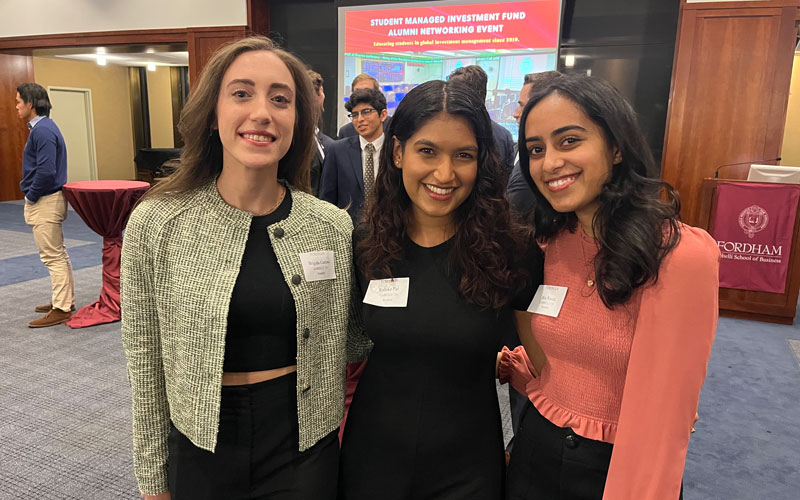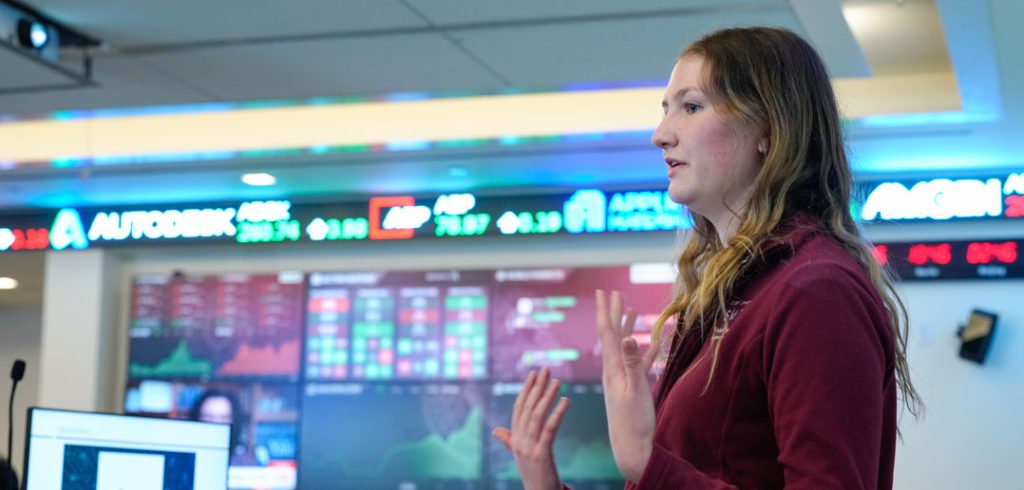Since 2010, the Student Managed Investment Fund has helped launch graduates’ careers in the financial world.
Researching companies in diverse sectors. Analyzing stock market data to understand trends. Deciding how best to invest more than $2 million of someone else’s money. This type of work happens daily at investment firms across the country. It also happens at Fordham’s Gabelli School of Business.
Through the Student Managed Investment Fund (SMIF), a two-semester course run by James Russell Kelly, students manage $2 million of the University’s endowment in a portfolio of stocks, bonds, and alternative assets.
Students start as analysts and are paired with second-semester students who work as portfolio managers. The analysts monitor sectors such as health care, energy, and real estate, while portfolio managers help make investment decisions and can take on additional roles, such as chief investment officer or quantitative analyst.
The fund started in 2010 with $1 million and has grown to more than $2.1 million, said Kelly, a senior lecturer in finance who also leads Fordham’s Gabelli Center for Global Security Analysis.
“The primary theme is student empowerment—students make all the investment decisions,” he said. “My role is to set the parameters to give guidance, guardrails.”
At the first-ever networking event for SMIF, held on February 6 in the 12th-Floor Lounge at the Lowenstein Center on the Lincoln Center campus, current students connected with alumni who shared how their experiences helped them in their careers in the finance and investing worlds. Attendees also shared their SMIF stories with Fordham Magazine.

Rohit Roy, Class of 2024
SMIF Role: Portfolio Manager, Health Care
Major: Finance with a Minor in Computer Science
“It’s active learning—you’re not learning from a textbook, you’re not learning theory. You’re looking at active real-world events and how they’re affecting the markets.
“Full time, I’m going to be working in trading [for Apex Capital after graduation]. So it’s a very, very direct kind of jump—you don’t really trade here, it’s more of a long-term investment mandate kind of thing. But a lot of the skills are obviously transferable. Like, you have to follow the markets closely, you have to understand how things work, be able to digest high-level information very quickly and act upon it. A lot of the skills link up quite nicely.”

Rishika Pal, Class of 2024
SMIF Role: Former Managing Director
Major: Finance with a Minor in Computer Science
“I learned about [SMIF] my freshman year and I was like, what a wonderful opportunity, given the fact that not many schools trust their students with a section of their endowment. Being able to actively manage it and gain mentorship was so important to me. It was a really great experience—I ended up becoming managing director for the fund, so that was a very full circle moment.
“It’s one thing to learn about [investing] in theory, but when you’re looking at it from a holistic portfolio perspective—what data is accessible to us? What should be our benchmarks? How do we forecast and manage our allocation and risk? That type of hands-on learning, I think, is very different and unique.”
Ria Naidu, Class of 2024
SMIF Role: Portfolio Manager, Information Technology
Major: Global Business with Concentrations in Finance and Economics
“I started looking into [the SMIF experience] my junior year, when I was figuring out my path. I thought it was a good opportunity to be able to [invest] money in an educational environment where there’s slightly more room for error than when you start in the real world. Whatever [work I’ll do as an equity research associate at Jefferies] will be pretty similar to what I’m doing now. So I think that’s been very helpful to get a glimpse of it, and actually be hands on and work with it, but also learn from Professor Kelly.”

Adam Arias, Class of 2025
SMIF Role: Analyst, Health Care
Major: Finance
“It’s kind of opening my eyes a little bit. It’s a very collaborative place. In SMIF, I can already tell your voice matters more. Your ideas are encouraged to come out.
“I’m going to be working in more of a client-facing role [in my internship at PIMCO this summer]. But [through SMIF] I’m getting experience in how to work in a team, where you kind of have an equal say, and then also just developing communication skills with everyone, being able to know what’s happening in the market and convey that to your manager. In my future role, hopefully I’ll be able to convey that to clients.”

Stephen Hearn, GABELLI ’15
Vice President, Public Finance & Infrastructure Direct Lending, J.P. Morgan
“I work in the bank’s public finance infrastructure portfolio, so [we’re] kind of taking all the management risk, very similar to what SMIF did. In SMIF, I learned the proper way to analyze risk, risk-reward, which is something I kind of carried into my job.
“[The SMIF experience is] something on your resume that most other kids from other schools won’t have, even if they’ve gone to an Ivy or something like that. You may not actually have practical investing experience unless you’ve done a program like this.”
Yaakov Musheyev, GABELLI ’20
High Yield Credit Research at J.P. Morgan
“I work in credit research, looking at industry trends, company-specific trends—and covering a sector in SMIF, I feel, was pretty similar: looking at headlines, looking at news for the sector we covered, building a model for one of the things we were trying to pitch, and then doing the whole presentation. So, building out the investment thesis and presenting it.”

Brigida Caruso, Class of 2024
SMIF Role: Co-Managing Director
Major: Global Business with Concentrations in Finance and Economics
“The hands-on research that we’re able to do—it’s more independently driven, so if you have an idea that you want to run with, you’re allowed to do that. And our class is done in the trading room at Rose Hill, so a lot of Bloomberg terminals are accessible there.”
Tyler Hoffman, Class of 2025
SMIF Role: Analyst, Industrials
Major: Finance
“I’m sort of working under someone who I learn from—[that’s] not to say that the professor doesn’t teach, but he’s there more to moderate and kind of give structure to things.
“I’ll be [interning] in banking this summer. A lot of it is just analyzing companies, and when you’re in a position of investing and having your money at stake, like Fordham’s money here, it kind of ups the ante in terms of how much work you put into looking at things. I think being able to transfer that to a banking context is really important.”


